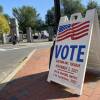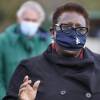I voted early on the first day Cambridge opened the polls at the three satellite locations across the city.
Cambridge is one of 61 cities and towns holding biennial elections for City Council and School Committee members. That also includes elections to fill vacancies left by resignations in the state legislature.
I wanted to get to my voting location before what I imagined would be a long line of voters. Last year, I arrived a half hour before the polls opened and had to join a line wrapped around the parking lot. The length had little to do with six feet apart required distancing — there were just a lot of people. All of them so anxious to cast a ballot they withstood —as I did — the rainy and chilly weather, raw enough to test the toughest New Englander.
While I didn’t think I’d have to stand in an especially long line this year, I was surprised that there was no line, and no steady stream of voters. Instead, what I witnessed was more akin to an intermittent dribble. I’d like to think I missed seeing many others because I arrived close to when the doors opened, but I fear it may be more evidence of diminished voter interest.
I know that the data consistently shows Americans are less inclined to show up for elections that aren’t for the president, the dismissively named “off-year” elections. Maybe it’s that kind of dismissiveness which gives voters permission to blow off primary elections. Only a quarter of Boston’s registered voters — about 108,000 — cast ballots in the September primary elections, making real Secretary of State William Galvin’s prediction of low voter turnout.
Secretary Galvin also does not expect the numbers to go up much more for tomorrow’s final election, even though voters will put Boston’s first elected woman in office after 200 years of mayors who were male and white — and even though the Boston mayoral race has drawn national attention for its historic importance.
Most registered voters will not be voting if the predicted low-voter turnout is right. I find it increasingly difficult to hear the excuse “my vote doesn’t matter” when there is so much evidence that every vote matters. Ask Boston City Councilor Julia Mejia whose one-vote victory made her the first Afro Latina on the council. And it’s appalling to me that the majority of voters — fully three-fourths of the electorate — are apparently okay with just a fourth of us deciding who our city leaders will be.
I understand the disappointment in candidates who abandoned promises once in office, and I deeply appreciate the righteous anger directed at those backtracking on policies because of influential deep-pocketed lobbyists. It’s frustrating and infuriating to witness. But there is no “power of the people” unless the people claim their power at the ballot box and vote the name-I-can’t-use-on-the air out.
Too many Americans were bloodied and murdered in the civil rights struggle to guarantee voting rights for African Americans. I go to the polls to honor those brave Black men and women and their allies who suffered the violence to make sure those who came after — like me — could have this most important citizenship right.
And that very right is being thwarted in Congress right now by a partisan effort to block legislation preventing racially targeted voter suppression. Opponents are counting on voters’ inattention and lack of empathy to undermine the laws that protect all voters’ rights.
I wear my “I voted” sticker proudly. There will never be a time I don’t vote, never a time I won’t talk about the importance of casting a ballot. So, once more with feeling — the polls are open all day tomorrow. Vote!








